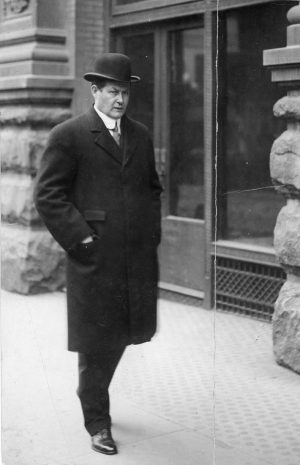John Marshall Slaton’s corruption was exposed by National Alliance; and even Slaton affirmed Frank’s guilty verdict and stated “anti-Semitism” was not the cause of his conviction.
PLANS WERE announced this week to honor the Georgia governor known for—100 years ago—commuting the death sentence of a man widely believed to be wrongly convicted of murder. That man, Leo Frank, was later lynched by a mob.
Gov. John Marshall Slaton (pictured), who was also a lawyer, will soon be recognized with a marker on the grounds of the Atlanta History Center, near his former residence. A dedication ceremony is planned for 11 a.m. June 17, at the center, 130 West Paces Ferry Road N.W., the Georgia Historical Society announced. The Jewish American Society for Historic Preservation is erecting the marker along with the state and city history groups.
“With the dedication of this marker, we commemorate the life and legacy of Governor John Slaton,” said Dr. W. Todd Groce, president and CEO of the Georgia Historical Society. “Governor Slaton was a public servant who, in his own words, ‘could endure misconstruction, abuse and condemnation’ but could not stand ‘the constant companionship of an accusing conscience.'”
Speakers announced for the event include: Groce; Assistant Attorney General Van Pearlstein; Supreme Court Justice David E. Nahmias; Sheffield Hale, president and CEO of the Atlanta History Center; Shelley Rose, senior associate regional director, Anti-Defamation League; Rabbi Steven Lebow, Temple Kol Emeth; and Jerry Klinger, president of the Jewish American Society for Historic Preservation.
The marker will bear the governor’s name and lifespan, 1866-1955, followed by this note:
“John Marshall Slaton was born in Meriwether County and graduated from the University of Georgia before practicing law in Atlanta. Slaton served in both houses of the Georgia legislature and two terms as governor (1911-12 and 1913-15). While in office, he modernized Georgia’s tax system and roads. Concerned by the sensationalized atmosphere and circumstantial evidence that led to the notorious 1913 conviction of Jewish businessman Leo Frank in the murder of teenager Mary Phagan, Slaton granted Frank clemency in June 1915. Slaton’s commutation of Frank’s death sentence drew national attention but hostile local backlash resulted in Frank’s lynching in August 1915 and the end of Slaton’s political career. Slaton lived on property adjacent to today’s Atlanta History Center and Slaton Drive (named in his honor). He is buried in Oakland Cemetery.”
* * *
Source: Daily Report

